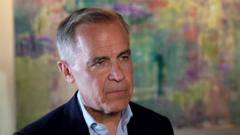In a recent interview with the BBC, Carney outlined his position on future relations with the U.S. amidst growing tensions following Trump's remarks about potentially making Canada the "51st state." He emphasized Canada's strength in trade and energy supply, asserting the necessity of respect in negotiations.
Canada's PM Mark Carney: Trade Talks with Trump 'on Our Terms'

Canada's PM Mark Carney: Trade Talks with Trump 'on Our Terms'
Canada's new Prime Minister Mark Carney asserts that he will engage in trade and security discussions with the U.S. only on conditions that honor Canadian sovereignty.
Canadian Prime Minister Mark Carney expressed strong points regarding the future of U.S.-Canada relations in an exclusive interview with the BBC as his historic election victory became official. Carney stated he would only consider dialogues over trade and security with President Donald Trump if they are conducted on Canada's terms, reflecting a broader desire for mutual respect between the two nations.
With approximately 75% of Canadian exports going to the U.S., the economic ties between the two countries are significant. However, Carney made it clear that Trump's past comments about Canada potentially being the "51st state" are unacceptable, emphasizing they would never happen. This sentiment is particularly relevant as relations have soured in recent months, fueled by Trump's remarks and the ongoing trade war that has seen tariffs imposed on both sides.
Carney explained that Canada contributes substantially to U.S. needs, being the largest supplier of crude oil and vital agricultural products, reinforcing how essential the Canadian economy is to several U.S. states. He stressed that Canada deserves respect in negotiations, promising that the discussions with Trump will be framed such that they acknowledge Canada's sovereignty and economic contributions.
The Prime Minister aims to leverage his expertise in finance, acquired during his tenure with the Bank of Canada and later as head of the Bank of England, to navigate the current trade landscape. Carney highlighted the idea that a beneficial partnership is possible but will require a shift in how the historical relationship has previously functioned under Trump.
As Canada gears up for the G7 summit in June, which will precede a crucial deadline concerning tariffs, Carney anticipates the summit will provide an essential platform for addressing global trade dynamics. He underscored the importance of deriving new trading agreements not just with the U.S. but also with allies like the UK and the EU in response to changing global circumstances. This strategic shift is intended to fortify Canada's position in an increasingly complex geopolitical landscape.
In closing, Carney's commitment to establishing a foundation for respectful and equitable trade negotiations signals a new approach to U.S.-Canada relations under his leadership, focusing on an economic and security partnership aimed at addressing both countries’ needs amidst rising tensions.




















